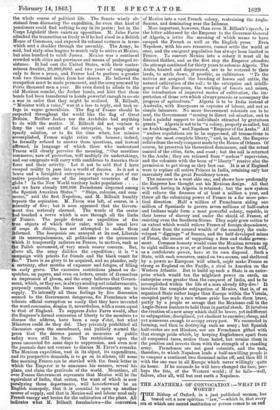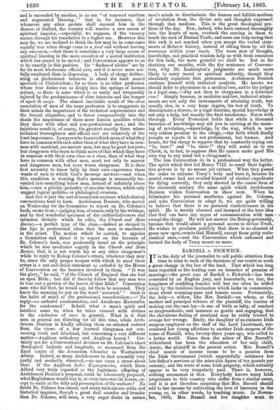THE ANATHEMA OF CONVOCATION :—WHAT IS IT WORTH?
THE Bishop of Oxford, in a just published sermon, has 1 traced out a new spiritual. "law,"—which is, that every era at which one sacred institution or person comes to an end and is succeeded by another, is an era "of renewed exertion and augmented blessing ; " that is, for instance, that whenever any other prelate shall succeed him in the diocese of Oxford, the country will receive a new access of spiritual impulse —especially, we suppose, if the vacancy occurs through his translation to a higher see. However this may be, we are inclined to think the law may be in some cases equally true when things come to a final end without leaving any successor, —that there is sometimes a very large access of spiritual blessing in the mere cessation of a sacred institution which has ceased to be sacred ; and Convocation appears to us to be exactly in this position. Its "flashes of silence" are by far its most wholesome official acts, and it is never more use- fully employed than in dispersing. A body of clergy deliber- ating on professional interests is about the least sacred spectacle in Christendom ; for as there is no other profession whose true duties run so deeply into the springs of human nature, so there is none which is so easily and irreparably injured by the predominance of class interests and the temper of esprit de corps. The almost inevitable result of the close association of men of the same profession is to exaggerate in their minds the importance of the technical acquirements and the formal etiquettes, and to throw comparatively into the shade the importance of those more human qualities which they share with other and non-professional men ; and the injurious result is, of course, the greatest exactly there where technical thoroughness and official tact are relatively of the least importance. Lawyers who learn to think more of what they have in common with each other than of what theyhave in com- mon with mankind, are narrow men, but may be good lawyers; but clergymen who learn to think more of that which they have in common with their own class as a class, than of what they have in common with other men, must not only be narrow and dangerous men, but even worse clergymen. It is their first necessity to know fully by their own experience those wants of men to which God's message answers—and when this condition is wanting God's message is necessarily tra- vestied into something below man, instead of infinitely above bim,—into a pitiable pedantry of oracular decrees, which only suggest logical quibbles or philological evasions.
And this is just the sort of sacerdotal creature which clerical convocations tend to form. Archdeacon Denison, who moved on Wednesday for the Committee to report on Dr. Colenso's book, seems to us,—judging him, of course, only by his writings, and by that wonderful specimen of dry authoritativeness and inhuman divinity which he edits, the Church and State Beriew,—a perfect type of the class,—indeed so steeped to the lips in professional ideas that the man is smothered in the priest. The motion which he carried, to appoint a Committee and direct it to report on the heresies of Dr. Colenso's book, was professedly based on the principle which he also inculcates eagerly in the Church and State Review, that it is not worth his or any other clergyman's while to reply to Bishop Colenso's errors, whatever they may be, since the only proper weapon with which to meet these errors is a cut-and-dried statement ex cathedra' by the House of Convocation on the heresies involved in them. "It was the glory," he said, "of the Church of England that she had an open Bible ; but did it thereby follow that any man was to tear out a portion of the leaves of that Bible ? Concerning men who did that, he would say, let them be accursed. They knew the meaning he put on the wonl,' accursed.' " Such is the habit of mind of the professional sacerdotalism ;—' No reply—ex cathedra condemnation, and Anathema Maranatha for the condemned.' Behold what a man's spirit and intellect come to, when he takes counsel with divines to the exclusion of me a in general. What is it that men in general are thirsting for all this time, while Arch- deacon Denison is kindly offering them an attested extract from the views of a few learned clergymen not con- cerning truth and falsehood, but concerning a very different matter—Anglican orthodoxy and Anglican heresy ? Cer- tainly not for a Convocational decision on Dr. Colenso's exact theological latitude and longitude, as measured from the fixed centre of the Jerusalem Chamber in Westminster Abbey. Indeed, as many Archdeacons in that assembly very justly and modestly observed, —no one cares a straw about that. If the Anglican Index Expurgatorius which Dean Alford very truly regarded as the legitimate offspring of Archdeacon Denison's proposal, could be laboriously prepared, whatEnglishman would buy it, or even turn over its leaves, ex- cept to smile at the folly and presumption of the authors ? No doubt Dr. Colenso has raised, and every such sincere critic and historical inquirer, though a great deal sounder and broader than Dr. Colenso, will raise, a very eager desire in exiles men's minds to discriminate the human and fallible medium of revelation from the divine acts and thoughts expressed through that medium. This is the great theological pro- blem of the day. Few, indeed, who have entered thoroughly into the hearts of men overlook the craving in them to touch the rock of Eternal Truth; and none can help seeing that this rock is not reached when you accept the verbal state- ments of Hebrew history, instead of sifting them by all the resources within your reach. The more men of thought, knowledge, and practical wisdom help us with fresh resources for this task, the more grateful we shall be. But as for shutting our mouths, with the dry sentences of Convoca- tion, why Dr. Lushington's judgments are much more likely to carry moral or spiritual authority, though they absolutely repudiate that pretension. Archdeacon Denison confuses himself with technical analysis. He knows we should defer to physicians in a medical case, and to the judges in a legal case,—why not then to clergymen in a doctrinal case ? Simply because, in medicine and law, technical attain- ments are not only the instruments of attaining truth, but usually also, in a very large degree, the test of truth. To discriminate a disease, or a legal doctrine, special knowledge is not only a help, but usually the final touchstone. Not so with theology. Every Protestant holds that while a thousand branches of knowledge may aid you in arriving at the mean- ing of revelation —knowledge, by the way, which is now very seldom peculiar to the clergy,—the faith which finally accepts or rejects it is not professional, but human. And hence, for the clergy to suppose that by constantly crying out "lo, here !" and "lo, there !" they will assist us to see Christ, is, in fact, to suppose that He cannot make good His own way to any mind but a clergyman's.
The less Convocation do in a professional way the better. The spirit which first led Henry VIII. to assail their legisla- tive powers is by no means yet extinct. When they passed the order to exhume Tracy's body and burn it, because its mortal owner had not availed himself of clerical expedients for dying correctly, they only showed in the coarse form of the sixteenth century the same spirit which Archdeacon Denison wishes Convocation to show now. When he fulminates his personal anathema against Dr. Colenso, and asks Convocation to adopt it, we are quite willing to believe that there is no personal vindictiveness in his spirit. He is merely alarmed and incensed at the bare idea that God can have any mboan of communication with man except the clergy. He will not answer the Bishop personally, • because that would admit a personal access to divine Truth. He wishes to proclaim publicly that there is no channel of grace now open, even to God Himself, except these petty eccle- siastical ones —and the Convocation which exhumed and burned the bi-Xly of Tracy meant no more.































 Previous page
Previous page